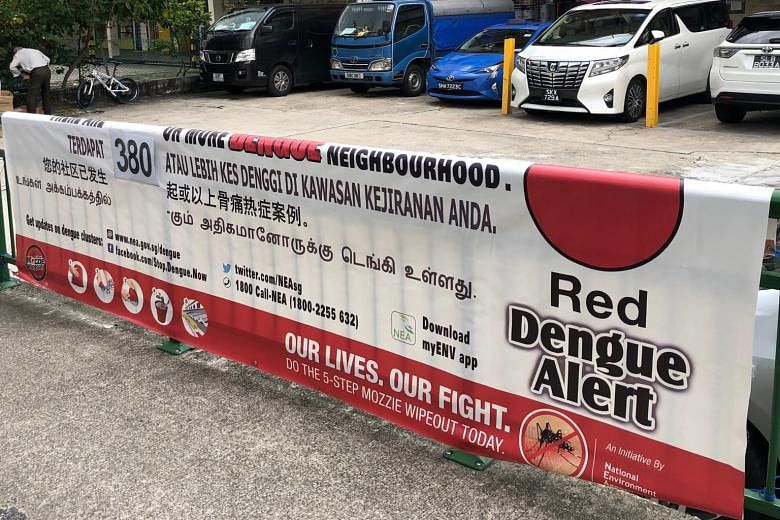SINGAPORE - A total of 28 people have died from dengue this year, amid the country's largest dengue outbreak.
The number surpasses the previous high 15 years ago, when full-year dengue fatalities hit 25, with the dengue death tally now matching the number of Covid-19 fatalities here.
The Ministry of Health said on Wednesday (Oct 14) that the death count was accurate as at Monday, and that the victims were between 25 and 92 years old.
Of the 28 cases, 24 had worked or lived in active dengue clusters.
A quarter of the deaths occurred over the past five weeks, since Sept 5.
As at Tuesday, 176 dengue clusters remained active across the island. Of these, one super cluster - with 300 or more people infected - is still active.
The cluster in Aljunied and Geylang has had 324 cases since it started on May 19.
This year's dengue outbreak has been the worst in Singapore's history, with 31,338 cases reported in the first 41 weeks, surpassing the previous high of 22,170 reported for the whole of 2013.
On Monday, Minister of State for Sustainability and the Environment Desmond Tan said that despite the weekly case numbers dropping significantly since the peak of 1,792 reported in a single week in July, Singapore is not "out of the woods".
Some 530 cases were recorded last week, a 70 per cent fall from the July peak.
However, Mr Tan noted that last week's number remained very high, and warned that next year might see another bad outbreak, if the new year started with a high baseline of cases.
Singapore is still in the midst of the yearly traditional dengue peak season, which usually takes place between May and October, when the weather is warmer.
Warmer weather facilitates faster reproduction of the Aedes aegypti mosquito which spreads the dengue virus, increasing the chances of dengue transmission.
The National Environment Agency's Gravitrap surveillance system has also detected a rise in the Aedes aegypti mosquito population for five consecutive weeks now, and that the rate of decline in weekly dengue cases has slowed over the last four weeks.
To avoid a second spike in weekly infections before the end of this year, cases would have to be brought down by more than half, said Mr Tan, who is also Minister of State for Home Affairs.
In response to questions in Parliament from several MPs about this year's dengue outbreak, Minister for Sustainability and the Environment Grace Fu said in August that a confluence of factors have contributed to the surge in dengue cases.
They included the prevalence of a less common dengue strain - DENV-3 - that the local population has low immunity to, more human targets for the female Aedes aegypti mosquitoes when people stayed home during the circuit breaker period, and the scaling back of services for cleaning and facilities maintenance - also during the circuit breaker period.


